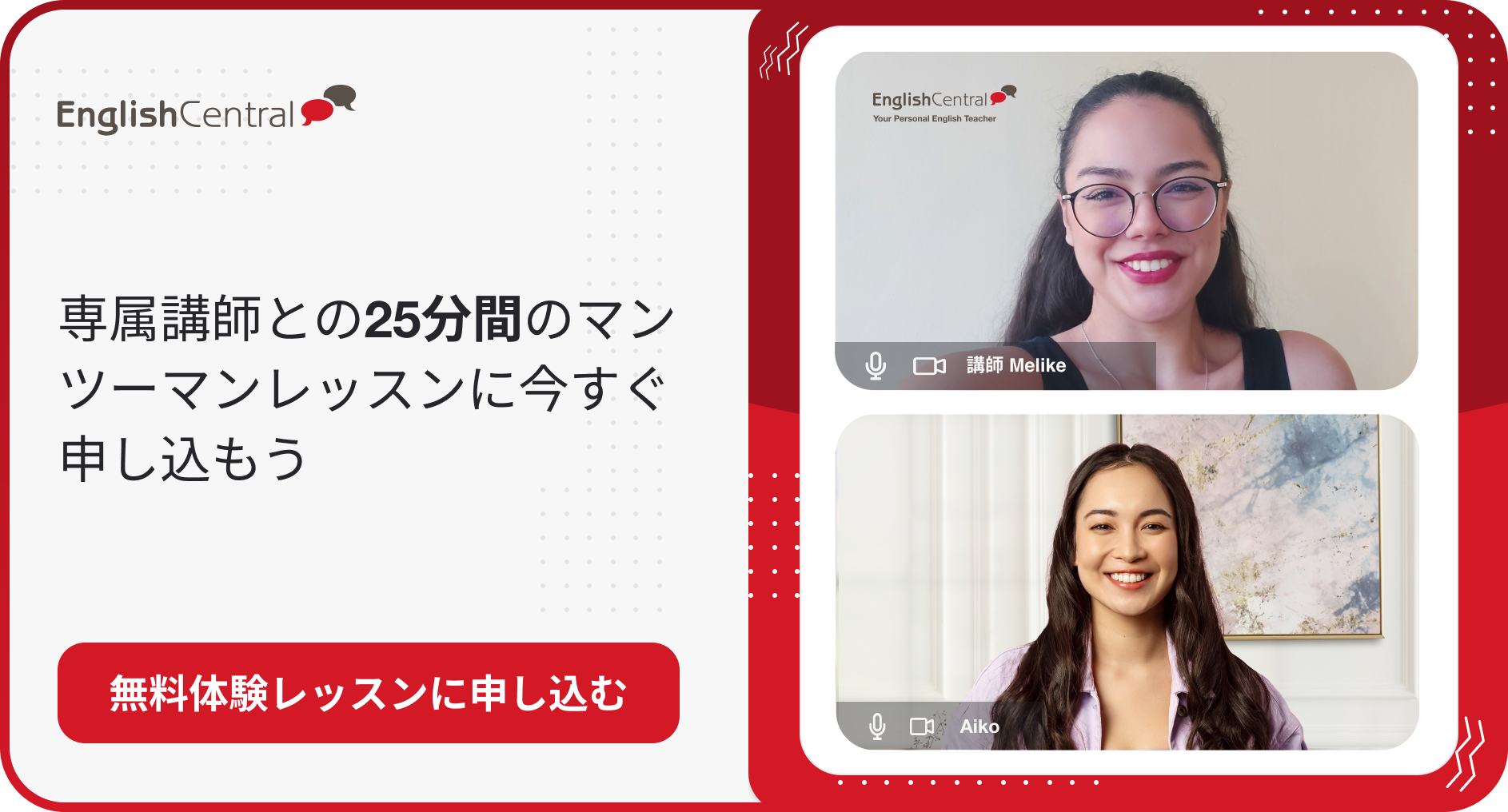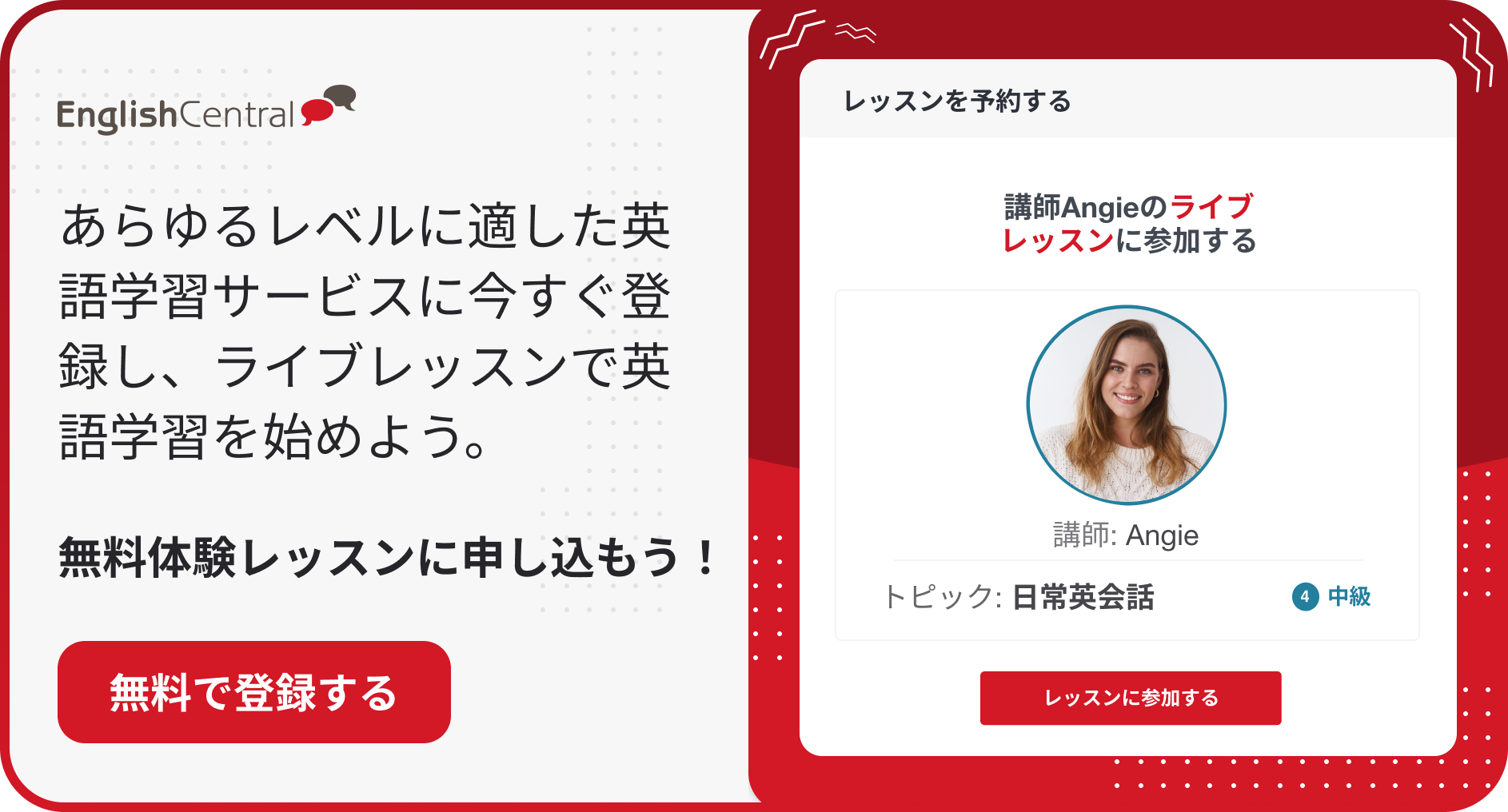皆さん、こんにちは!句動詞(phrasal verbs)という言葉を耳にしたことはありますか?句動詞は、動詞と副詞または前置詞が結びついたもので、多くの英語の表現において重要な役割を果たします。
句動詞は、動詞と他の単語(通常は副詞や前置詞)が組み合わさったもので、元の動詞の意味が変わることがあります。句動詞を覚えることで、英語の表現力が大幅に向上し、より自然な会話ができるようになりますので一緒に学んでいきましょう!
この記事で学習する内容を練習してみませんか?EnglishCentralは全世界で800万人が利用!動画を活用した英会話レッスンをもっと手軽に。ChatGPTと提携したAI機能を駆使して、あなたの英語総合力を鍛えます。無料登録後、20,000本の動画見放題。そして、オンライン英会話レッスン1回無料。こちらから。
Transitive Phrasal Verbs
他動詞句動詞(Transitive Phrasal Verbs)は、目的語を必要とする句動詞です。例えば、「turn on the light」のように、動詞句の後に目的語が続きます。
例文
– She **turned on** the radio.(彼女はラジオをつけました。)
– He **gave up** smoking.(彼は喫煙をやめました。)
– They **called off** the meeting.(彼らは会議を中止しました。)
– She **brought up** an interesting topic.(彼女は興味深い話題を持ち出しました。)
– He **looked over** the report.(彼はレポートに目を通しました。)
– We **put off** the event until next week.(私たちはイベントを来週まで延期しました。)
Intransitive Phrasal Verbs
自動詞句動詞(Intransitive Phrasal Verbs)は、目的語を必要としない句動詞です。例えば、「break down」のように、動詞句のみで意味が通じます。
例文
– The car **broke down**.(車が故障しました。)
– She **woke up** early.(彼女は早く目覚めました。)
– He **passed away** last year.(彼は昨年亡くなりました。)
– They **grew up** in a small town.(彼らは小さな町で育ちました。)
– The concert **sold out** quickly.(コンサートはすぐに売り切れました。)
– The cat **ran away**.(猫が逃げました。)
Separable Phrasal Verbs
分離可能な句動詞(Separable Phrasal Verbs)は、目的語が句動詞の間に入ることができる句動詞です。例えば、「turn on the light」や「turn the light on」のように使えます。
例文
– Please **turn off** the TV.(テレビを消してください。)
– Please **turn** the TV **off**.(テレビを消してください。)
– She **looked up** the word.(彼女はその単語を調べました。)
– She **looked** the word **up**.(彼女はその単語を調べました。)
– He **called back** the customer.(彼は顧客に折り返し電話しました。)
– He **called** the customer **back**.(彼は顧客に折り返し電話しました。)
Inseparable Phrasal Verbs
分離不可能な句動詞(Inseparable Phrasal Verbs)は、目的語が句動詞の間に入ることができない句動詞です。例えば、「look after」のように、一体となって使います。
例文
– She **looked after** the children.(彼女は子供たちの世話をしました。)
– He **ran into** an old friend.(彼は旧友に偶然会いました。)
– We need to **deal with** this issue.(この問題に対処する必要があります。)
– She **came across** a new idea.(彼女は新しいアイデアを思いつきました。)
– They **got over** the obstacle.(彼らは障害を乗り越えました。)
– He **came up with** a solution.(彼は解決策を思いつきました。)
英語の句動詞の一覧表
| 句動詞 | 意味 | 例文 |
|---|---|---|
| break down | 故障する | The car broke down. |
| bring up | 育てる | She brought up her children well. |
| call off | 中止する | They called off the meeting. |
| carry on | 続ける | Please carry on with your work. |
| come across | 偶然見つける | I came across an old photo. |
| find out | 見つける | He found out the truth. |
| get along | 仲良くする | They get along well. |
| give up | 諦める | She gave up trying. |
| go on | 続ける | The show must go on. |
| look after | 世話をする | He looks after his dog. |
| look for | 探す | She is looking for her keys. |
| make up | 作り話をする | He made up a story. |
| put off | 延期する | They put off the meeting. |
| run into | 偶然会う | I ran into my teacher. |
| take off | 離陸する | The plane took off. |
| turn off | 消す | Please turn off the light. |
| turn on | つける | She turned on the TV. |
| wake up | 目を覚ます | He woke up early. |
| work out | 解決する | They worked out the problem. |
| write down | 書き留める | Please write down the address. |
| bring about | 引き起こす | The new policy brought about changes. |
| cut down | 減らす | He cut down on sugar. |
| fall apart | 崩れる | The book fell apart. |
| get over | 克服する | She got over the illness. |
| look into | 調査する | They are looking into the issue. |
| pass away | 亡くなる | His grandfather passed away. |
| pick up | 拾う | He picked up the pen. |
| put on | 着る | She put on her coat. |
| run out | 尽きる | They ran out of milk. |
| show up | 現れる | He showed up late. |
| take care of | 世話をする | She takes care of her brother. |
| turn down | 断る | He turned down the offer. |
| use up | 使い果たす | They used up all the paper. |
| break up | 別れる | They broke up last year. |
| call back | 折り返す | I will call you back later. |
| check out | 確認する | Please check out the website. |
| come up with | 思いつく | She came up with a great idea. |
| do over | やり直す | He did the assignment over. |
| get by | 何とかやっていく | They get by on a small income. |
| give in | 屈する | He gave in to pressure. |
| hang out | ぶらぶらする | They hang out at the park. |
| hold on | 待つ | Please hold on for a moment. |
| keep up | 維持する | She keeps up with her studies. |
| let down | 失望させる | He let his team down. |
| look up to | 尊敬する | She looks up to her mentor. |
| move on | 次に進む | It's time to move on. |
| put up with | 我慢する | She puts up with the noise. |
| set up | 設定する | He set up the meeting. |
英語の句動詞に関するよくある質問
Q1: 英語の句動詞とは何ですか?
A1: 英語の句動詞(phrasal verbs)は、動詞と副詞または前置詞が結びついて一つの新しい意味を持つ表現です。例えば、「give up」は「諦める」、「look after」は「世話をする」という意味になります。句動詞は、動詞単独では持たない意味を生み出すため、英語の表現力を豊かにする重要な要素です。
句動詞には主に4つの種類があります:
他動詞句動詞(Transitive Phrasal Verbs):目的語を必要とする(例:turn on the light)
自動詞句動詞(Intransitive Phrasal Verbs):目的語を必要としない(例:wake up)
分離可能な句動詞(Separable Phrasal Verbs):目的語が句動詞の間に入ることができる(例:turn off the light / turn the light off)
分離不可能な句動詞(Inseparable Phrasal Verbs):目的語が句動詞の間に入ることができない(例:look after the child)
Q2: 英語の句動詞の特徴は?
A2: 英語の句動詞(phrasal verbs)は、以下の特徴を持つ表現です:
複数の要素から構成される:句動詞は通常、動詞と副詞または前置詞が結びついたもので、それぞれの語が結合して一つの新しい意味を形成します。例えば、「give up」は「諦める」という意味になり、元の「give」と「up」からは想像できない意味を持ちます。
新しい意味を持つ:句動詞は元の動詞の意味に対して、全く異なる意味を持つことが多いです。このため、文脈に依存して意味を理解する必要があります。例えば、「run into」は「走り込む」という意味ではなく、「偶然出会う」という意味になります。
分離可能なものと不可能なものがある:句動詞の中には、目的語が動詞と副詞/前置詞の間に入ることができる分離可能な句動詞(separable phrasal verbs)と、入ることができない分離不可能な句動詞(inseparable phrasal verbs)があります。例として、「turn off the light」と「turn the light off」のように使えるものと、「look after the child」のように一体となって使うものがあります。
自動詞と他動詞がある:句動詞には、自動詞(intransitive phrasal verbs)と他動詞(transitive phrasal verbs)があり、他動詞は目的語を必要とし、自動詞は目的語を必要としません。例えば、「wake up」は自動詞、「put off」は他動詞です。
日常会話で頻繁に使われる:句動詞は英語のネイティブスピーカーにとって非常に自然で日常的な表現であり、会話やカジュアルな文章の中で頻繁に使用されます。そのため、句動詞を覚えることは英語学習者にとって重要です。
Q3: ネイティブがよく使用する句動詞は何ですか?
A3: 英語のネイティブスピーカーが日常的に頻繁に使用する句動詞は多くあります。
以下はその中でも特によく使われる句動詞とその意味、例文です:
Get up(起きる)
意味:ベッドから起きる、立ち上がる
例文:I get up at 7 a.m. every day.(私は毎日午前7時に起きます。)
Turn on(つける)
意味:電気や機器をつける
例文:Can you turn on the TV?(テレビをつけてくれますか?)
Turn off(消す)
意味:電気や機器を消す
例文:Please turn off the lights when you leave.(出るときに電気を消してください。)
Take off(脱ぐ、離陸する)
意味:服を脱ぐ、飛行機が離陸する
例文:He took off his coat.(彼はコートを脱ぎました。) The plane takes off at 6 p.m.(飛行機は午後6時に離陸します。)
Put on(着る)
意味:服やアクセサリーを身につける
例文:She put on her hat before going out.(彼女は外出する前に帽子をかぶりました。)
Give up(諦める)
意味:何かを諦める、やめる
例文:Don’t give up on your dreams.(夢を諦めないで。)
Look for(探す)
意味:何かを探す
例文:I’m looking for my keys.(私は鍵を探しています。)
Look after(世話をする)
意味:人や物の世話をする
例文:She looks after her younger brother.(彼女は弟の世話をしています。)
Find out(見つける、発見する)
意味:情報や事実を見つける
例文:I need to find out more about this topic.(このトピックについてもっと知る必要があります。)
Come up with(思いつく)
意味:アイデアや計画を思いつく
例文:She came up with a great idea for the project.(彼女はプロジェクトの素晴らしいアイデアを思いつきました。)
英語の句動詞を理解し、使いこなすことは、英語学習において非常に重要です。リストを活用し、日常生活の中で繰り返し使ってみてください。そうすることで、英語の表現力が自然に向上するでしょう。頑張ってください!
English Centralでは英語学習を効果的かつ楽しくサポートするアプリもご利用いただけます。その豊富な動画ライブラリから興味のあるトピックを選んで学習できるので、自分のペースで学習を進めることができます。App Store や Google Play から今すぐダウンロードして、楽しく英語をマスターしましょう!











